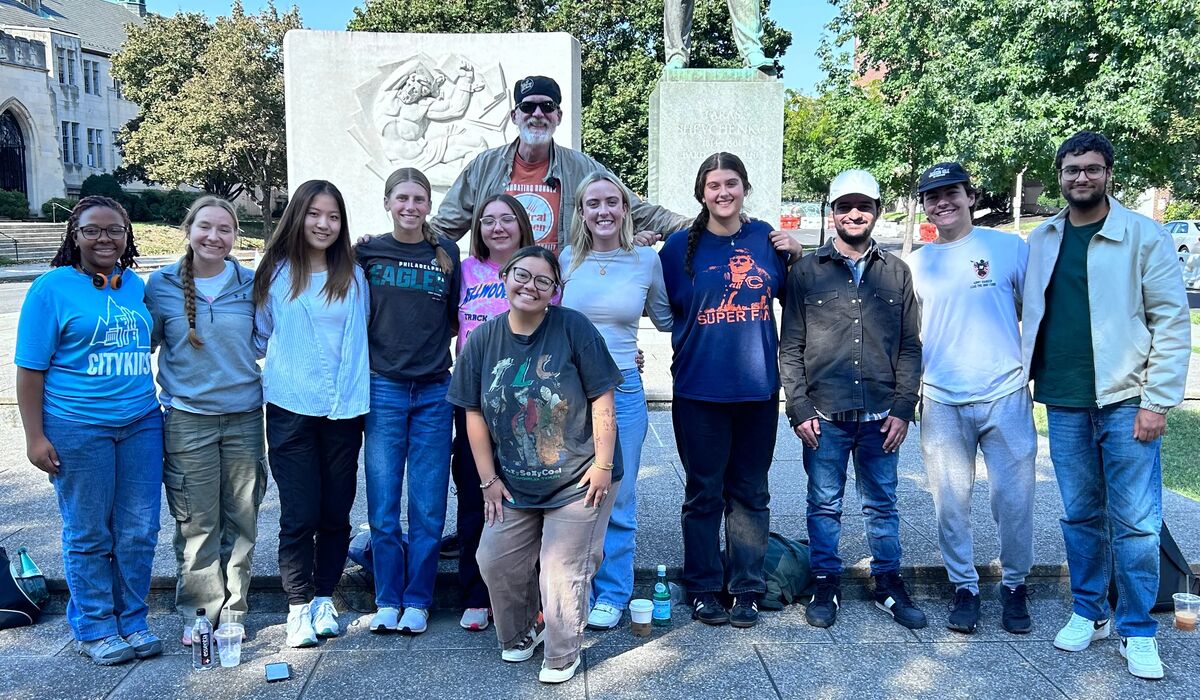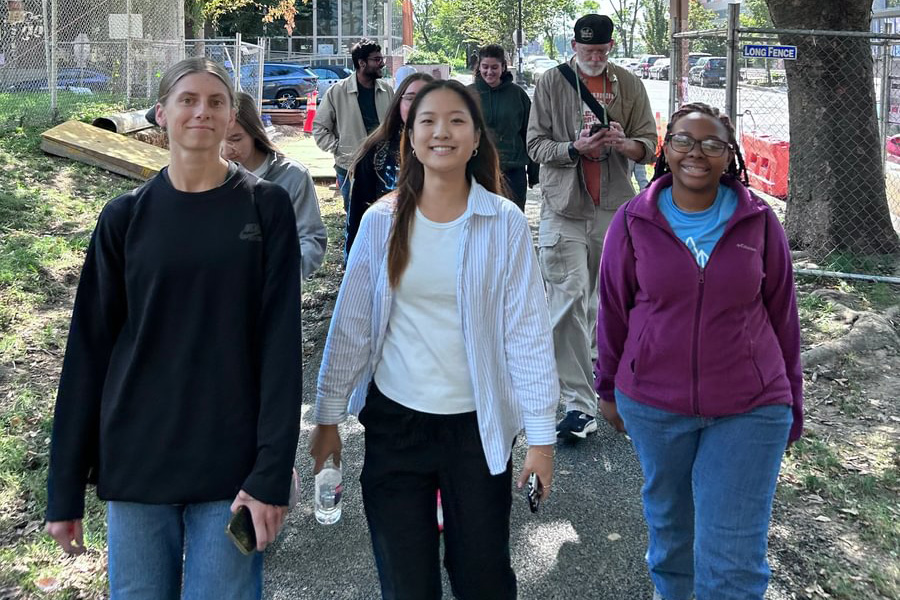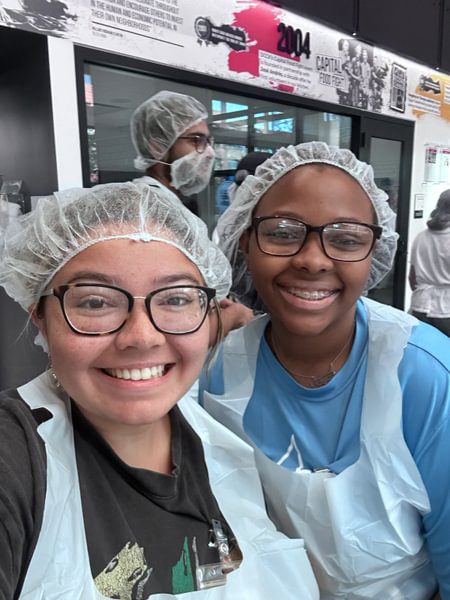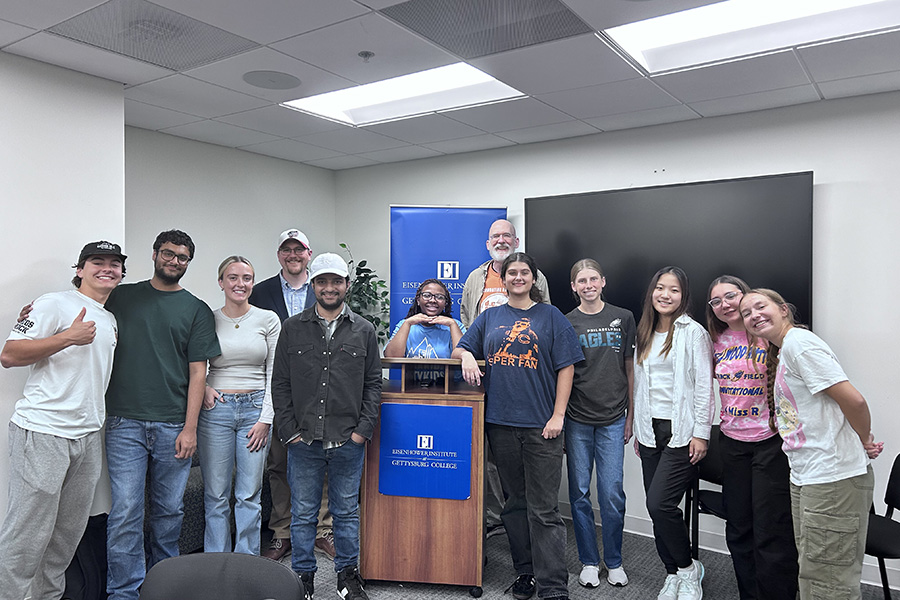
First-Year Seminars are designed to give students in their first semester at Gettysburg College a unique community and ability to collaborate closely with faculty and peers, exploring a topic of similar interest. Together, they develop enduring skills through engaging discussions, field trips, and more.
Every fall, English Prof. Christopher Fee teaches a First-Year Seminar entitled Tryin' to Find a Way Back Home: Introduction to Literature of Homelessness in America. This course allows first-year students to dive into the concept of homelessness, reflecting on its common perceptions within the United States to better understand why it’s important to care and how to take action to help those in need.
In partnership with the Center for Public Service (CPS), this seminar has both a traditional academic lecture and an immersive learning experience in the nation’s capital. Students take a field trip to Washington, D.C. to meet with people affected by homelessness, give back to their community by volunteering, and engage with national agencies to broaden their knowledge to combat homelessness.

For the past 25 years, Fee, who arrived at Gettysburg in 1997, has developed his seminar to be consequential for his students, finding value in allowing them to witness homelessness firsthand in D.C. and participate in local service opportunities in Adams County, Pennsylvania.
“Working collaboratively with the good folks at CPS, I have spent the past quarter century developing and nurturing relationships with community partners both in Gettysburg and Washington, D.C.,” Fee said. “These partner agencies offer our students aspirational models of motivated and admirable individuals and institutions that have proven track records of profound impact upon the communities they serve.”
“I ask first-year students to get their hands dirty in the actual work those partners do,” he continued. “I try to expose our students to a range of service opportunities and approaches. These range from tried-and-true aspects of direct service to creative, entrepreneurial, innovative, and cutting-edge new theories and methodologies designed to enact meaningful and permanent change.”
Mercedes Cao ’25, the seminar’s Peer Learning Associate this semester, enrolled in his course as a first-year student and has embarked on the D.C. trip for the past two years assisting Fee.
“This class trip was a moment to learn and reflect on what students have been learning,” said Cao of West Hartford, Connecticut. “Through this experience, students saw how homelessness take place in real time. Students got to visualize what was being done by nonprofits, national governing organizations, and the government, and what still needs to be done. This class trip was a catalyst for what students can continue to do to actively influence change in our society.”
This year’s cohort recently returned from their trip and reflected on their experience, an essential skill gained through the Gettysburg Approach. Kenzie Miller ’28, Caitlin Woods ’28, and Muhammad Musa Cheema ’28 all saw classroom lessons come to life during this year’s trip, exploring stereotypes, addiction, shelter living, and architecture in our nation’s capital that impact the lives of the homeless.
“Our students are tomorrow’s leaders, and I want them to gain for themselves the tools and knowledge they need to become the changes they would like to see in their world,” said Fee.
Read reflections from Miller, Woods, and Cheema, who left inspired after hearing firsthand accounts from homeless individuals, no matter their backgrounds and experiences.
Joint Reflection by Kenzie Miller ’28 and Caitlin Woods ’28
Majors: Undeclared
Miller’s Hometown: Manchester, New Hampshire
Woods’ Hometown: Downingtown, Pennsylvania

“We started out at DC Central Kitchen. Most of us were chopping vegetables and some were assigned fruits. It was really fun to be around everyone and be able to work with our hands because we knew that work was really going to be useful and was going to help so many people.
“After volunteering, we went to the National Coalition for the Homeless, which was our favorite part of the entire trip. Hearing the stories of the brave individuals was very eye-opening and moving. We always talk in class about the experiences people go through and the reasons they become homeless, but hearing it firsthand made it real for me. The three individuals who spoke were so brave to share their stories. We are so thankful that they did because it really speaks on the various reasons people become homeless, the struggles they went through, and most importantly, where they are today.
“Pizza with Joshua Stewart ’11, director of federal policy at Fahe, was very interesting because his job is so involved in the homeless issue. He provided amazing insight on how he and his company are working on making a change in Appalachia.
“Then it was time to go into local parks and hand out clothes and toiletries. The whole experience was very impactful. They were thankful, extremely outgoing people, and very friendly. It was great to have a regular conversation with them and get to know them. It was clear that a simple interaction made them very happy.
“More importantly, being with everyone with such a passion for a large issue around the country was so moving. We learned so much more about homelessness during our trip because of meeting individuals with their own stories, and that is very special.”

Reflection by Muhammad Musa Cheema ’28
Major: Computer science, political science, and economics triple major
Minor: Data science minor
Cheema’s Hometown: Lahore, Pakistan
“The D.C. trip was an eye-opening experience. The day began at the DC Central Kitchen, where the trainers ensured we strictly followed health standards and safety rules, emphasizing the importance of hygiene when preparing food for vulnerable populations.
“Afterward, we visited the National Coalition for the Homeless, where we met Penny, Nicky, and Sean—three individuals with lived experiences of homelessness. The stories they shared gave me insights that changed how I view homelessness. Nicky struck a chord with me and highlighted the importance of mental resilience during difficult times.
“We then met for a discussion with Joshua Stewart ’11, which focused on the policy side of homelessness. Meeting him gave me a clearer picture of how advocacy efforts and policy changes are essential to addressing homelessness on a larger scale.
“The final part of our trip involved distributing clothes to the homeless in parks around D.C. As an international student from a developing country, I didn’t expect to see homelessness so visibly present in the capital of the United States. I’ve participated in clothing drives back home, but this experience was different—here, the people we met were incredibly grateful for the clothes we brought, even if the items didn’t fit. Distributing clothes allowed me to see these individuals as more than just statistics or concepts discussed in class. It gave a face to homelessness, reinforcing that these are real people with real stories.
“It was also a moment of reflection for me—I realized how easy it is to make assumptions about people’s lives based on appearances. Thus, the trip was both challenging and rewarding. It connected the theoretical knowledge from class with real-world experiences, deepening my understanding of homelessness in ways that readings alone could not have.”
Related Links:
External Links:
By Ainsley Green '27
Posted: 11/12/24